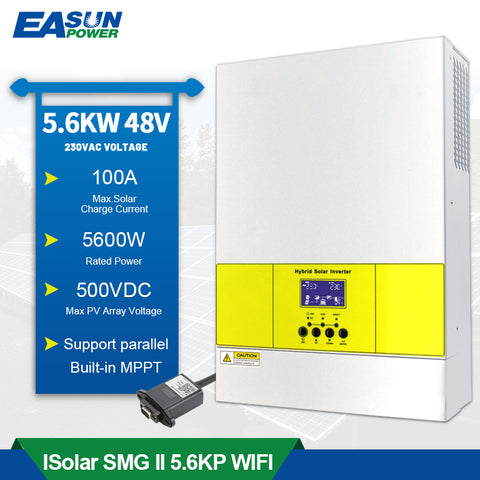
Can Solar Inverters Enhance Grid Integration and Energy Independence?
As the world shifts towards more sustainable and renewable energy sources, solar power has emerged as a frontrunner in the quest for cleaner and greener electricity generation. At the heart of this transition lies the solar inverter, a technology that plays a pivotal role in converting the sun's energy captured by solar panels into usable electricity for homes, businesses, and industries. However, the significance of solar inverters extends far beyond energy conversion – they also have the potential to enhance grid integration and promote energy independence. In this article, we will delve into the ways in which solar inverters contribute to these important aspects of the renewable energy landscape.

① Understanding Solar Inverters
Before delving into the benefits of solar inverters for grid integration and energy independence, let's briefly explore their functionality. A solar inverter is a device that converts the direct current (DC) electricity generated by solar panels into alternating current (AC) electricity that can be used to power electrical appliances and devices. This conversion process is essential to ensure compatibility with existing power grids and electrical systems.
② Enhancing Grid Integration
1. Voltage and Frequency Regulation:Solar inverters play a crucial role in regulating voltage and frequency. They ensure that the electricity generated by solar panels meets the standards set by the local power grid. By maintaining stable voltage and frequency levels, solar inverters contribute to the overall stability and reliability of the grid.
2. Reactive Power Control:Solar inverters can actively manage reactive power, which is necessary for maintaining grid stability. Reactive power control helps balance the reactive load on the grid, reducing the risk of voltage fluctuations and grid instability.
3. Grid-Friendly Operation:Many modern solar inverters are equipped with advanced features that enable grid-friendly operation. These inverters can respond to grid signals and adjust their output to support grid stability during peak demand periods or fluctuations in renewable energy generation.
4. Grid Services:Solar inverters can provide valuable grid services such as frequency regulation and voltage support. In some cases, solar inverters can even contribute to ancillary services, such as grid balancing and voltage control, which are critical for maintaining a reliable and resilient power supply.
③ Promoting Energy Independence
1. Localized Energy Generation:Solar inverters enable localized energy generation, allowing homes, businesses, and industries to produce their own electricity. This reduces dependence on centralized power plants and helps distribute energy production across the grid.
2. Net Metering and Feed-in Tariffs:Solar inverters facilitate net metering and feed-in tariff programs, allowing excess energy generated by solar systems to be fed back into the grid. This not only reduces electricity bills for solar system owners but also contributes to the overall energy supply.
3. Peak Load Reduction:Solar inverters can help reduce peak electricity demand by generating electricity during sunny hours, which often coincides with high demand. By doing so, solar inverters contribute to easing the strain on the grid during peak load periods.
4. Battery Storage Integration:Solar inverters can be combined with energy storage systems, such as batteries, to store excess energy generated during the day for use during nighttime or cloudy periods. This integration further enhances energy independence by enabling self-consumption and reducing reliance on the grid.
Conclusion:
Solar inverters are not only key players in the conversion of solar energy into usable electricity but also integral components in the transformation of our energy landscape. By enhancing grid integration through voltage regulation, frequency control, and grid-friendly operation, solar panel inverter contribute to a stable and resilient power grid. Moreover, their role in promoting energy independence cannot be understated – from localized energy generation to peak load reduction and energy storage integration, solar inverters empower individuals and communities to take control of their energy consumption and reduce their environmental footprint.
As renewable energy adoption continues to rise, the importance of solar inverters in achieving a sustainable and reliable energy future becomes increasingly evident. With ongoing advancements in technology and grid management strategies, solar inverters are poised to play an even more significant role in shaping the way we generate, distribute, and consume electricity.

Lascia un commento